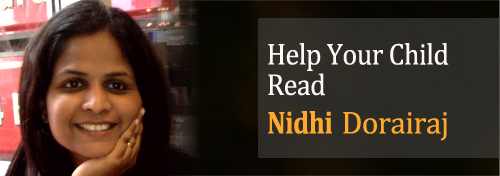Help Your Child Read
One of the most gratifying milestones that my child reached in the last one year is of her becoming an independent reader. It is a joy to hear her read and find her poring over books on her own. Though I cannot claim full credit for her becoming a fluent reader in her own right, there are certainly some strategies that I used which helped her development as a reader.
1. Surround them with books
That’s the simplest thing that you can do really. Children by their very nature are curious beings. Keep something in their vicinity and they are bound to explore. And there is no age bar absolutely. If your toddler is drooling all over your glossy magazine – rest assured that it’s not just the pictures but the words too that are having an impact.
Kidlet’s first ever pram had a cloth book attached to its safety bar. She literally chewed on it for many months, but she would sit in rapt attention whenever I read it out to her.
2. Read aloud
But obviously. Before they can read for themselves, you are the medium between the words and your child. Spend a few minutes every day reading aloud to your child. Choose books with bright pictures and big lettering initially. Point to the words as you read aloud.
I am not a big believer in the flash card methodology of learning to read. Books typically follow a story-line however short. The context of pictures and stories provides a child with a richer reading experience. And studies have shown that as a child progresses as a reader, it is the context and complexity of stories, which makes them more fluent and helps them build their vocabularies.
3. Lead by example
You cannot expect your child to become interested in reading by merely putting a few books around her. She may show interest in them for a while due to sheer novelty, but the real impetus will come if she sees you reading. It may just be a newspaper or a paperback, but do model your reading habits so that your child can see you.
And if your child asks you what you are reading, do not shy away from responding. Tell them about what you have been reading in the most age-appropriate way possible.
4. It’s not just books
Reading at the end of the day is not restricted to just books. We are surrounded by a world of words. Open your computer, newspaper or window – words are staring down at us. Use this to pique your child’s interest. Indeed, billboards usually make for great reading practice – since they typically have bold and bright lettering. Every time you stop at a traffic signal, play a little game of reading as many words as you can. The same logic applies to almost anywhere that you can spot a word.
5. Don’t compare
Finally, and most importantly, don’t be in a rush to make your child a fluent reader. It will happen – that’s a certainty. But like all milestones – this one too varies from child to child. Some children start reading as early as two! That doesn’t mean you start shoving books down your child’s throat pronto. Encourage and give support but do not hurry your child along or worse still compare with any other kid.
I do hope that these pointers are useful to parents of early readers out there! Do you have any other strategies that could be useful to parents? Do share! And happy reading 🙂
Nidhi Dorairaj Bruce is a Freelance writer from Mumbai. With no formal education in Parenting, she has been getting on-the-job training ever since her daughter, affectionately referred to as ‘the kidlet’, arrived on the scene 5 years ago. On Twitter, you can connect with Nidhi @typewritermom

